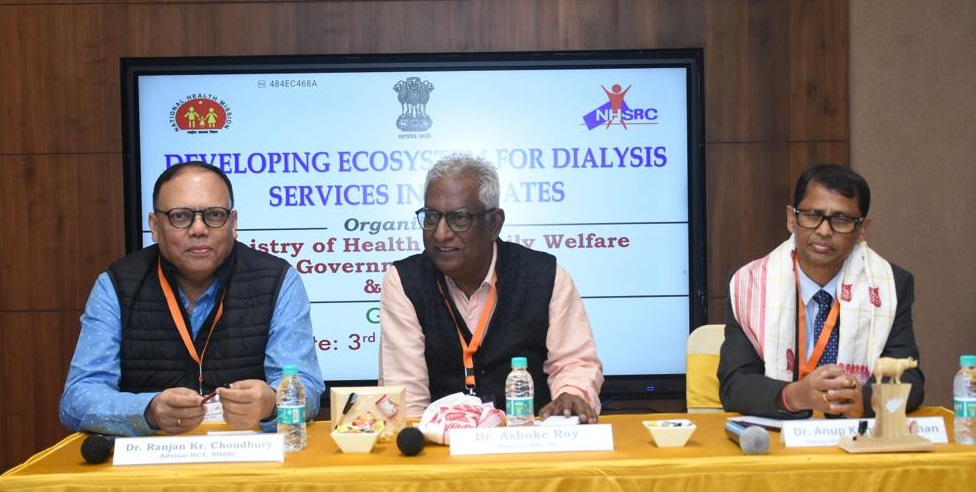Guwahati: The journey towards ‘One Nation, One Dialysis’ has started in Northeast India states under the National Health Mission, and is now eyeing to widen its ambit in a PPP-mode.
To intensify ‘One Nation, One Dialysis’ initiative in Northeast India, a central team from the Ministry of Health and Family Welfare (MoHFW) and the service partners in PPP model had an extensive discussion on Saturday to build a robust ecosystem for scaling up dialysis services.
Traditionally, Northeast India suffers from poor supply chain due to connectivity and transportation issues.
Non-availability of a favourable dialysis ecosystem in the Northeast is due to lack of Nephrologists, poor supply chain regarding equipment and consumables, lack of trained staff and poor after sales service/spare availability.
A brainstorming session was undertaken on Saturday at Guwahati with all stake holders from Northeast states and private service providers engaged in delivery of dialysis services.
Vishal Chauhan, joint secretary (Policy) of the the Ministry of Health and Family Welfare deliberated upon the different issues related to the northeastern region.
He said funding is not a problem, especially for site preparation for the dialysis centres. The fund in the NHM pool can be utilized for such projects.
The joint secretary re-iterated that the objective of the meeting is to develop a sustainable dialysis care ecosystem in Northeast India with the help of private service partners in the Public-private partnership model.
The states are supported by the MoHFW under the National Health Mission for implementation of Pradhan Mantri National Dialysis Programme (PMNDP) at all the District Hospitals.
Pradhan Mantri National Dialysis Program (PMNDP) was announced by the Ministry of Health & Family Welfare in 2016 under the National Health Mission (NHM).
The PMNDP aims at strengthening of District Hospitals by providing affordable dialysis services. The first phase of program was envisaged for setting up of haemodialysis centers across all the districts of country.
All BPL patients are getting free of cost dialysis services under PMNDP.
Availability of nephrologists and proximity to multi-specialty hospitals are other parameters to consider as Chronic Kidney Diseases (CKDs) patients are usually in a fragile state of health and the likelihood of any life-threatening emergency arising anytime need to be addressed.
Huge opportunity exists in Northeast India in providing reliable dialysis services for all and in ensuring better accessibility.
The number of dialysis patients is increasing as a greater number of dialysis centre established in the states.
Nearly 14,500 new patients with CKD had been registered in the different public Dialysis Centres in Northeast India during April to October 2022 and 1.40 Lakhs dialysis sessions have been conducted in addition to the services availed at private sector. A Central Registry will be of immense help.
Moving towards the Central Registry and for maintenance of health records of patients, ABHA (Ayushman Bharat Health Account) number is a 14-digit number that will uniquely identify a patient in India’s digital healthcare ecosystem.
A portal for creating state registry using ABHA IDs is already operational which offers visibility and portability of the dialysis patient to avail dialysis free of cost in any district of the statein case a vacant slot is available.
This concept of ‘One State-one Dialysis’ will eventually progress to ‘One Nation -One Dialysis’ in the country.
Assam, Sikkim and Tripura are expected for providing dialysis services in all the districts by 2022-23 but still lagging in other five North Eastern States – Arunachal Pradesh, Manipur, Meghalaya, Mizoram, and Nagaland.
In Northeast India, the programme is being implemented in 72 Public Health facilities across 64 districts with deployment of 400 machines as of October 2022.
The state of Arunachal Pradesh and Assam have implemented the programme through Public Private Partnership and Tripura has implemented it in mixed model, and State of Manipur, Meghalaya, Nagaland, and Sikkim have implemented it in in-house mode.















